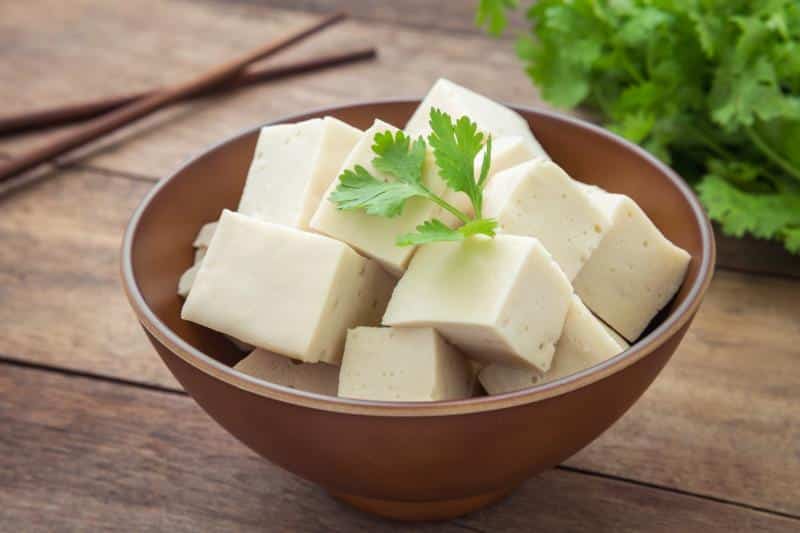7 interesting facts about how much protein is in a serving of firm tofu
Tofu is a food that is unique because it is a plant-based source of protein that has the same amino acid profile as meat, eggs, and dairy products. Tofu is made from soybeans, which are a complete protein. Tofu can be used in recipes in place of meat, eggs, or dairy products.
In this article, we will discuss some interesting facts about tofu including the amount of protein in a serving of tofu.
1. What is Soy Bean Flour?
Tofu is made from soybean, which is a complete protein. Tofu can be used in recipes in place of meat, eggs, or dairy products. For people on a vegetarian or vegan diet, tofu is not just a meat alternative, but an all-purpose meat substitute.
There are 6 grams of protein in one cup of cooked or drained tofu, along with 12 grams of dietary fiber and 9 grams of carbohydrates. Now, before you jump from your bed, these facts about tofu are not so alarming. As a high-protein ready-to-eat product, tofu tends to give you the needed nutrients for your body.
On the other hand,
Tofu is also a sustainable source of protein, which is widely available due to the “milk crisis.”
Oil from soybeans is environmentally friendly as it is a renewable agricultural fuel and bulks up soybean oil to produce biodiesel fuel.
If you know there’s dairy in milk and eggs in eggs, what else you can play with?
If possible, try to get your hands on organic tofu in order to avoid genetically modified supplements and antibiotics for your body’s overall health. Though fresh, organic tofu has extra flavor, but feel free to get your hands on processed tofu in the refrigerator to lower the cooking time.
2. Proteins: The Foundation of Life (or Not)
Does it make sense to consumers that proteins are one of the most important building blocks of human life?
How much protein one adult should consume daily remains a question that needs to be answered through experimentation with living organisms on an empirical basis.
This first occurred in the late nineteenth century, when experiments showed that protein was the limiting nutrient for humans in until then-known environments. These discoveries led to several organizations that attempted to develop an optimum diet for higher-level life, the Six-Day Diet, the Tundra Diets, the Prudent Diet, and the Prophecy Diet (Williams, 1983).
Between 1897 and 1901, chemists changed diets during the Manhattan Project to help with their access to barium, lead, and other elements used in atomic bomb research. The end result was diet with greater animal protein replaced the 6-diet and the birth of the Low-Fat Diet.
But many of the early hypotheses surrounding this decision came from animal experiments. For the pursuit of knowledge, the fallacy inherent in using animals as a model for humans didn’t deter people from conducting these experiments.
Between 1893 and 1901, researchers compiled the first known research results which related that the ratio of protein to calories for each individual was the most decisive determinant for dietary needs.
Based on this claim, nutrition needs across populations set the base development of the popular fad diets of the twentieth century.
3. How Protein Works
People are constantly bombarded by marketing materials about the benefits of eating more protein at every meal. According to the claims made by many companies selling protein bars, shakes, and supplements, high-protein diets are necessary to build lean muscle and burn fat.
However, the research literature simply does not support such claims.
While the recommended daily allowance of protein is roughly 0.8 to 1.2 grams per kilogram(2.2 pounds) of body weight.
Learn how different sources of dietary protein affect your strategy for weight management in this interactive infographic.
People wishing to lose weight tend to eat more of the available protein than those who are trying to maintain or add muscle.
People who consume more protein while also consuming more calories than their body needs (about 9 calories for every gram of protein) will gain weight, according to a study by researchers at Uppsala University College in Sweden
According to the USDA National Nutrient Database (Exactly how much protein is in a single serving of tofu?).
The FDA indicates that one-fourth cup of tofu has at least 8 grams of protein.
4. How to Control the Proton Dense Fluid
Tofu is a food that is unique because it is a plant-based source of protein that has the same amino acid profile as meat, eggs, and dairy products.
Today, many people use tofu in a form called “forbidden food” — tofu.
With tofu, you can enjoy high protein without eating meat, poultry, fish, or eggs. Tofu is low in phosphorous, sodium, cholesterol, and electricity.
Tofu is great because it is of healthier kind of food and is perfect for dieting.
One serving of tofu protein contains 6 grams of protein.
5. The Juiciest Story Ever Telling About Soy Beans and Soy Bean Flour
Soybeans have been used to make tofu, soy protein isolates, tofu, soy milk, citrus fruits, rich desserts, meat substitutes, nutrition supplements, and smoothies. Because of how the production of soybeans varies on climate conditions and food processing, there are different grades of soybean products, similar to the different grades of flour and other food products available. If you’re only buying soybeans, or any other seed product, for the future and don’t think you may grow your own, choose organic soy. The difference between organic soybeans and soybeans that are not organic as well as their impact on soil, animals, farm workers, the environment and you are a topic for another article.
6. Experimental Results
The amount of protein that is contained in a serving of tofu starts at about 8 to 10 grams per portion.
One of the main reasons why tofu is gradually becoming a mainstream food is its ability to mimic the composition of animal proteins.
Tofu is made by pressing out the milk solids from soybeans. It is quite lightweight, and the protein levels are highest in the beans, fiber, and amine groups.
7. Tofu has about 8 to 10 grams of protein in 1/4 cup
Tofu is a food that is unique because it is a plant-based source of protein that has the same amino acid profile as meat, eggs, and dairy products. Tofu is made from soybeans, which are a complete protein. Tofu can be used in recipes in place of meat, eggs, or dairy products.
Therefore, vegetarian and health-conscious people can commit to tofu as an ideal food.
What’s more, the molecules of tofu do not contain B vitamins and that makes it unique. Soybeans that are insufficient in B-vitamins act like a diuretic. That’s why tofu acts as a diuretic which contributes to one’s weight loss.







